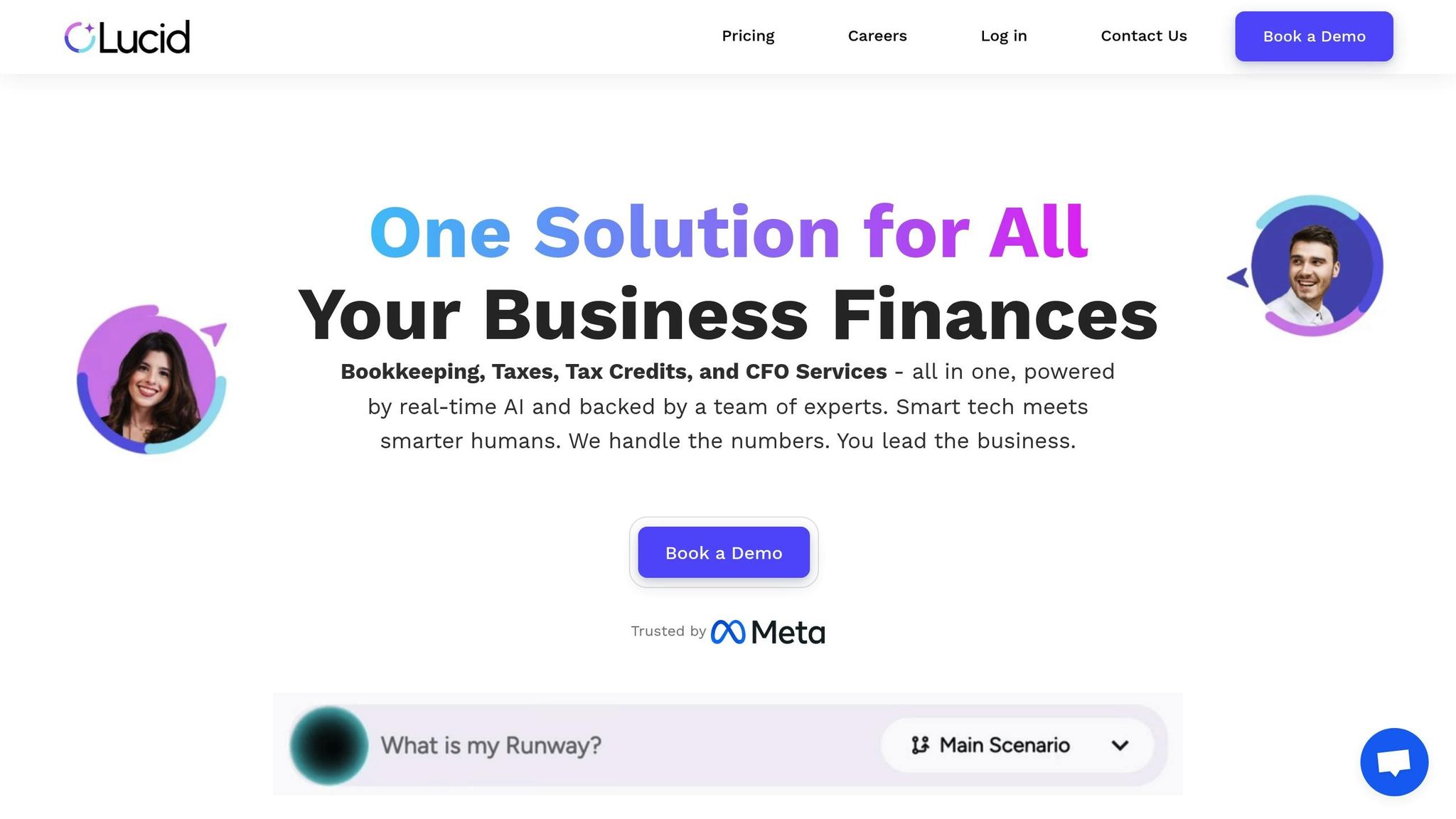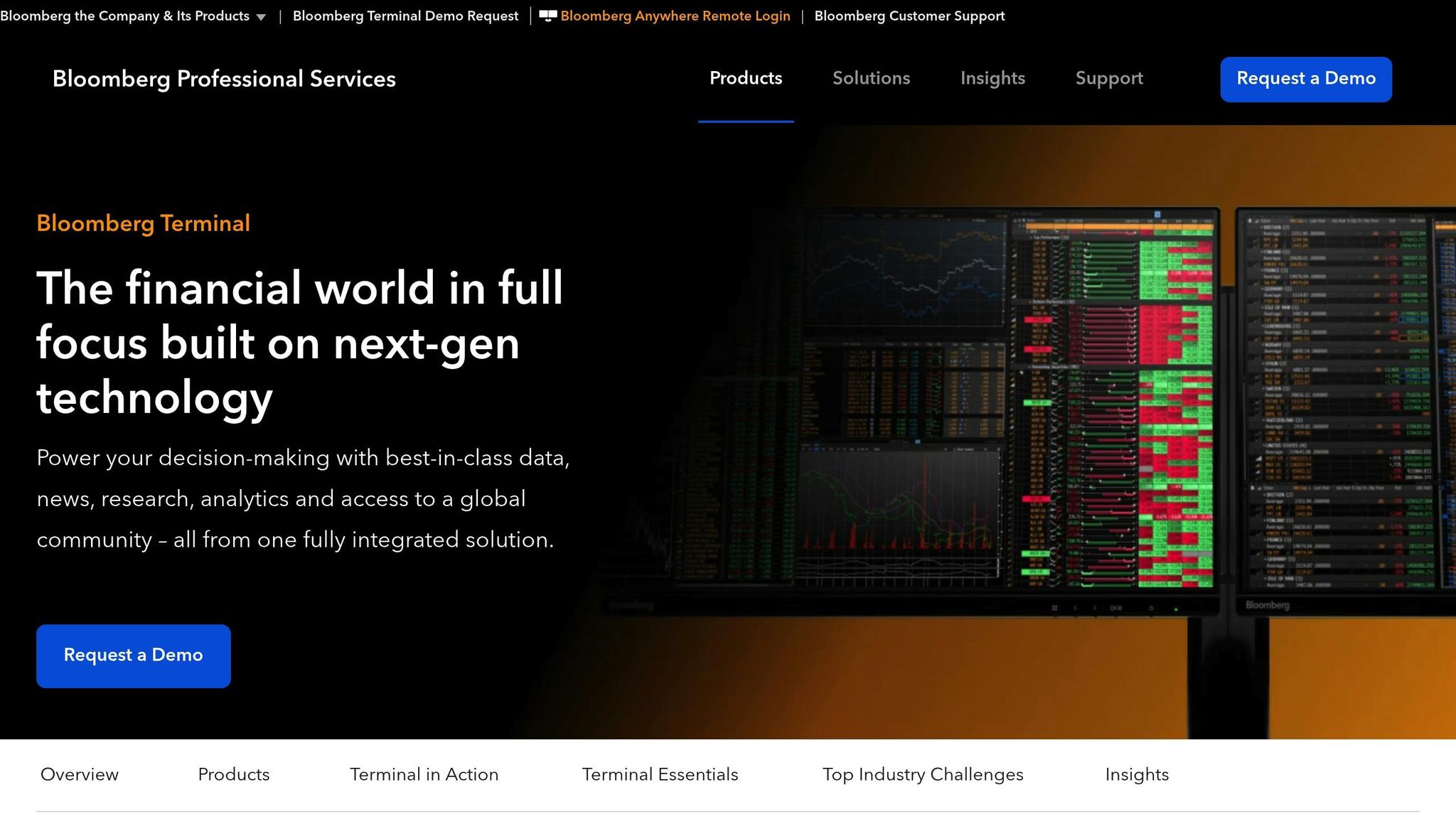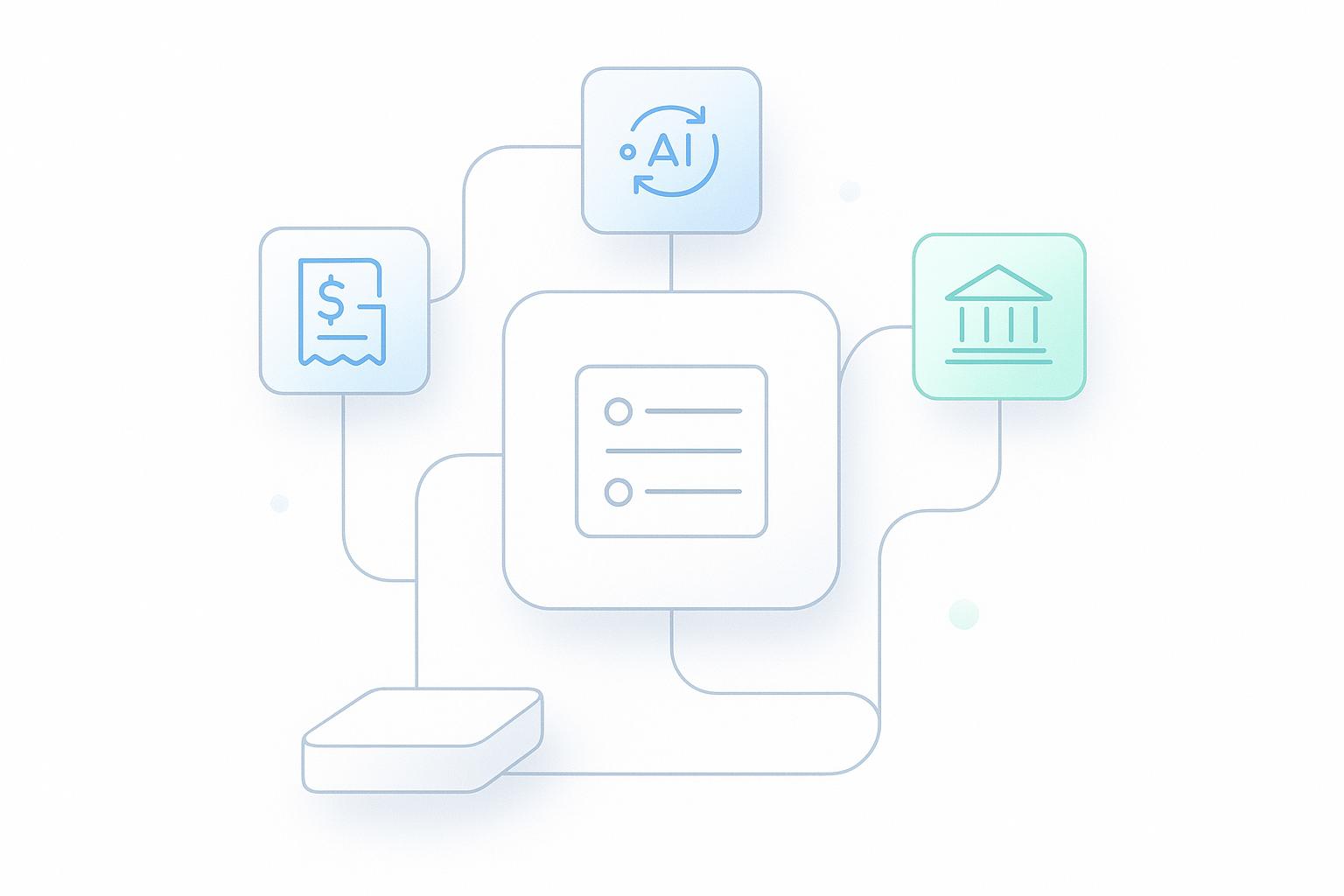Real-time investor reporting is transforming how startups and financial firms operate. Instead of waiting for quarterly updates, investors now get continuous financial insights, helping them make faster decisions. AI tools are at the forefront of this shift, automating processes, reducing errors, and offering features like predictive analytics and anomaly detection.
Here are four standout AI tools reshaping investor reporting in the U.S.:
- Lucid Financials: Tailored for startups, it combines accounting, tax services, and CFO support with Slack integration for instant financial updates. Pricing starts at $150/month.
- Bloomberg Terminal: A trusted choice for institutional investors, it provides real-time global market data and advanced analytics but costs $24,000–$30,000 annually per user.
- aiiro: Automates data extraction and financial reporting, saving time while ensuring compliance with U.S. standards.
- GPT-5: Excels in financial modeling and scenario analysis, offering advanced AI-powered insights but requires human oversight for accuracy.
Quick Comparison:
| Tool | Best For | Key Features | Cost |
|---|---|---|---|
| Lucid Financials | Startups | Slack integration, real-time updates | $150/month |
| Bloomberg Terminal | Institutional investors | Market data, analytics, SEC compliance | $24K–$30K/year |
| aiiro | Mid-sized companies | Automation, compliance, error reduction | Varies |
| GPT-5 | Enterprises | Advanced modeling, scenario analysis | Custom pricing |
Key takeaway: Startups benefit most from Lucid Financials for its simplicity and affordability, while larger firms may prefer Bloomberg Terminal or GPT-5 for robust analytics and modeling. Choose the tool that aligns with your company’s size, budget, and reporting needs.
Automating Investor Communication with AI Agents | Investor Relations Agent
1. Lucid Financials

Lucid Financials is making waves as the first AI-powered full-stack accounting firm designed specifically for startups and fast-growing businesses. It combines bookkeeping, tax services, tax credits, and CFO support into one smart platform. The result? Clean, accurate books within seven days and investor-ready reporting that’s always up to date. This all-in-one system ensures instant access to critical financial data.
One of its standout features is the integrated Slack interface, which allows founders to get immediate answers to financial questions without leaving their communication tool. For example, if an investor asks about burn rate, founders can instantly provide accurate numbers directly through Slack.
Lucid’s AI takes care of tasks like transaction reconciliation, expense categorization, and spotting anomalies - reducing manual reporting time by up to 100 times. This efficiency frees up founders to focus on strategic decisions instead of routine financial chores. For startups, where time is often the most valuable resource, this kind of speed is a game-changer.
The platform also delivers scenario analyses and real-time insights into critical metrics like burn rate and runway. With just one click, founders can create board reports or investor updates. Startup leaders have already seen the difference this makes in their day-to-day operations.
"Lucid turned our bookkeeping and taxes from a headache into a simple, reliable process. Their CFO insights give us clarity to plan growth with confidence - it feels like having a full finance team on demand", shares Aviv Farhi, Founder and CEO of Showcase.
Security is another key focus for Lucid. The platform meets enterprise-grade standards with SOC 2 compliance, data encryption, multi-factor authentication, and regular audits. For startups managing sensitive investor funds, this level of protection is non-negotiable.
Lucid’s pricing starts at $150 per month, offering a flat, transparent fee structure tailored to startups. It scales effortlessly from pre-seed to Series C, handling complex financial needs like equity structures, stock grants, and multi-entity setups. This adaptability ensures startups get the support they need at every stage.
Luka Mutinda, Founder and CEO of Dukapaq, highlights the impact: "As we scaled, budgeting and cash flow became critical. Lucid's CFO services give us the visibility we need, while their bookkeeping and tax support keep everything accurate and stress-free. It's been a game-changer for our operations."
With its always-on approach, Lucid ensures financial data is updated in real time - whether a startup is growing, fundraising, or expanding its team. This constant accessibility makes it an invaluable partner for businesses navigating rapid change.
2. Bloomberg Terminal

The Bloomberg Terminal stands as a cornerstone for financial professionals, offering institutional-grade data and real-time reporting tools. With over 350,000 users worldwide, it provides unmatched access to global market intelligence and automated reporting solutions, making it a go-to resource for investment firms and financial analysts alike.
Every day, the platform processes more than 100 million data points from markets around the world. This constant stream of information delivers instant insights into company profiles, pricing trends, and economic indicators. For investment firms, this means they can produce investor reports that reflect the latest market conditions without relying on time-intensive manual data collection.
One standout feature is its ability to integrate live market data directly into Excel. This automation eliminates the need for manual data entry, allowing portfolio managers to monitor stock performance and create custom investor reports with current information seamlessly.
Another advantage lies in its customization options. Users can personalize dashboards, set alerts for key market events, and design tailored reporting templates. This flexibility ensures that reports not only meet the firm's specific needs but also align with their branding and communication preferences.
Compliance and regulatory support are also areas where Bloomberg Terminal excels. It offers secure data handling, detailed audit trails, and direct access to SEC filings, which are crucial for adhering to U.S. financial regulations. The platform’s AI-driven analytics further enhance reporting by enabling pattern recognition, predictive modeling, and anomaly detection. These tools allow firms to identify market trends and potential risks more efficiently, leading to sharper, forward-thinking investor reports.
That said, the Bloomberg Terminal isn't without its drawbacks. The annual subscription cost ranges from $24,000 to $30,000 per user, making it a significant investment. Additionally, its extensive feature set can be overwhelming for smaller firms or those new to the platform.
Despite these challenges, the Terminal remains indispensable for many. Over 90% of the world’s largest asset managers rely on it for portfolio analysis and investor reporting. Its secure messaging system, Bloomberg Chat, is widely used for compliant communication with investors, further solidifying its role in institutional finance. While it may not cater to the specific needs of startups, its comprehensive approach makes it a leader in the field.
For firms that require detailed market coverage and powerful analytics, Bloomberg Terminal delivers the tools needed for reliable, real-time investor reporting. It’s a platform built for those who demand accuracy and depth in their financial insights.
3. aiiro

aiiro is a cutting-edge platform that combines machine learning and natural language processing to revolutionize financial reporting and investor communications. By handling multiple document formats - like PDF, Excel, Word, and PowerPoint - it automatically extracts crucial financial data, eliminating the need for manual input.
One of aiiro’s standout features is its ability to process financial data in real time. This enables instant anomaly detection, compliance verification, and performance tracking, empowering investors and executives to act quickly in response to market shifts. Beyond just data extraction, aiiro streamlines the creation of earnings reports, performance summaries, and compliance documents by integrating information from filings and internal systems. The result? Reports that used to take weeks are now completed in days, offering detailed, accurate insights for investor presentations and board meetings.
A mid-sized U.S. tech startup showcased aiiro's impact by adopting it to automate their quarterly earnings reports. By integrating aiiro with their accounting system, the company slashed report preparation time by 70%, eliminated reconciliation errors, and provided investors with real-time performance dashboards. This shift not only improved transparency but also sped up funding decisions.
aiiro’s integration capabilities make it especially appealing to U.S. businesses. It works seamlessly with popular tools like Excel, QuickBooks, and cloud-based financial databases, ensuring compatibility with U.S. currency formats, date/time standards, and regulatory requirements. This ease of integration minimizes setup hassles while maintaining compliance.
Security is another area where aiiro excels. The platform employs industry-standard encryption, role-based access controls, and detailed audit trails to protect sensitive financial data. These measures ensure compliance with U.S. regulations, including SOX and SEC guidelines, giving users peace of mind.
aiiro’s advanced document interpretation capabilities are another game-changer. It accurately processes complex tables and numerical formats, reducing the time analysts spend on tedious data cleanup. The platform also maintains context across documents and adapts to different numerical formats, setting it apart from traditional reporting tools.
Financial professionals, including analysts and CFOs, have praised aiiro for allowing them to shift their focus from manual tasks to strategic analysis. The platform reduces reporting errors, shortens close cycles, and uncovers predictive insights - all of which are crucial for growing companies aiming to elevate their investor relations efforts.
While aiiro offers transformative benefits, companies may encounter challenges like data compatibility and integrating legacy systems. To address this, the platform provides robust APIs, pre-built connectors for major U.S. financial tools, and dedicated onboarding support to ensure a smooth implementation process.
sbb-itb-17e8ec9
4. GPT-5 for Financial Modeling
GPT-5 takes financial modeling and investor reporting to a new level with its advanced reasoning skills. Unlike earlier versions, it can handle complex tasks like multi-variable analysis, revenue and margin breakdowns, cost structure refinement, and in-depth financial risk evaluations. With an expanded context window, it processes larger datasets and more intricate financial documents, enhancing both the accuracy and depth of analysis.
This model is particularly adept at creating detailed financial models and identifying investment opportunities that might escape human analysts. It can automatically generate three-statement models, simulate both optimistic and pessimistic scenarios, and deliver real-time insights by pulling data from sources like SEC filings and financial databases. Its efficiency in modeling integrates seamlessly into everyday workflows, making it a powerful tool for enterprises.
By embedding GPT-5 into platforms such as Microsoft 365 Copilot and Azure AI Foundry, companies can maximize its potential. The model formats reports to align with U.S. standards, including currency symbols ($), date formats (MM/DD/YYYY), and comma-separated numbers, ensuring compliance with American business practices.
One of the standout features is its ability to drastically cut down the time required for quarterly filings - from 8–12 hours to less than ten minutes. This is achieved through automated tools for extraction, reconciliation, and validation. This speed allows finance teams to provide boards and investors with crucial guidance days ahead of traditional timelines.
GPT-5’s natural language processing capabilities further enhance its utility. It can extract key metrics, interpret narrative disclosures, and distinguish between recurring and one-off items in financial statements. With over 99% accuracy, the model maintains document context while adapting to various numerical formats.
Customization is another strong suit of GPT-5. Companies can fine-tune the model to include industry-specific financial terms, integrate it with unique data sources, and tailor output formats to meet regulatory or stakeholder requirements. Firms can even develop tailored AI agents to automate specific reporting workflows, prioritize tasks, and generate insights suited to their unique business contexts.
To address compliance and security concerns, GPT-5 includes robust safeguards. It automates the validation of financial models, ensuring conformity with regulatory standards and maintaining audit trails. Additionally, it cross-checks figures, verifies disclosure completeness, and ensures alignment with regulatory guidelines, reducing audit risks and protecting against penalties.
Despite its advancements, human oversight remains critical. While GPT-5 can automate much of the reporting process, finance professionals must validate AI-generated insights to ensure their reliability, particularly in volatile or unconventional financial scenarios. This is especially important for startups transitioning to real-time investor reporting. Expert review is essential in cases where the model’s training data may not fully cover the context.
Finally, GPT-5 is leveling the playing field in financial analysis. With the decreasing cost of AI implementation, smaller funds and individual investors now have access to analytical tools that were once the domain of large institutions. This shift is empowering smaller players to compete more effectively with established market leaders.
Advantages and Disadvantages
Every AI tool offers its own set of strengths and challenges when it comes to real-time investor reporting. Knowing these trade-offs can help you choose the right platform for your needs.
Lucid Financials is a standout for startups, offering an all-in-one solution that combines bookkeeping, tax services, and CFO support. Its direct Slack integration provides real-time financial updates, making it a valuable tool for founders who need quick, accurate insights without juggling multiple vendors. However, it may fall short for enterprises needing highly customized reports or for companies operating outside U.S. regulations, as its flexibility in those areas is limited.
For those requiring institutional-grade tools, Bloomberg Terminal leads the pack with unmatched access to real-time global market data. Its advanced analytics, market trend recognition, and seamless Excel integration make it a go-to for portfolio managers and institutional investors. The downside? It comes with a hefty price tag of $2,000–$2,500 per user per month, along with a steep learning curve that can be daunting for users who don’t need its full range of features.
aiiro takes a different approach, using agentic AI to autonomously analyze large datasets, prioritize tasks, and deliver actionable insights at lightning speed. It excels at automating data extraction and reducing errors, freeing finance teams to focus on strategic decisions. However, it can struggle with context in volatile or unconventional markets, and its insights may lack the depth needed for highly complex financial scenarios. Additionally, enterprise adoption is still in progress, which could limit scalability for some organizations.
GPT-5 for Financial Modeling offers cutting-edge modeling capabilities, integrating data from multiple sources to provide enterprise-grade solutions. Still, it requires technical expertise to operate effectively, and its AI-generated outputs must be carefully reviewed to avoid errors. Human oversight remains critical to ensure the reliability of its insights.
To better understand how these tools stack up, here’s a side-by-side comparison:
| Tool | Advantages | Disadvantages |
|---|---|---|
| Lucid Financials | Quick setup, Slack integration, all-in-one startup solution | Limited customization for enterprises, U.S.-focused, needs human review for edge cases |
| Bloomberg Terminal | Extensive global data, institutional-grade reliability, advanced analytics | High cost ($2,000–$2,500/month), steep learning curve, complex interface |
| aiiro | Automates analysis, reduces errors, delivers strategic insights | Struggles with volatile markets, evolving scalability for enterprises |
| GPT-5 | Advanced modeling, multi-source integration, enterprise-grade capabilities | Requires technical expertise, prone to AI errors, needs human oversight |
The pricing differences highlight the divide between tools aimed at startups and those designed for large institutions. Bloomberg Terminal’s premium cost caters to institutional clients, while Lucid Financials offers a more affordable option for startups, with flat-rate pricing starting at $150 per month. This shift in pricing reflects how financial tools are becoming more accessible, giving smaller businesses and individual investors access to capabilities that were once exclusive to major institutions.
Final Recommendations
Choose an AI tool that matches your company’s current needs and technical skill set.
For U.S. startups and high-growth companies, Lucid Financials is an excellent choice for founders looking for streamlined financial management without the overwhelming complexity of enterprise tools. Designed specifically for startups, it delivers focused, efficient reporting at a price that fits early-stage budgets. This makes it especially useful when preparing financials for investors or managing day-to-day operations.
Aviv Farhi, Founder and CEO of Showcase, shared his experience: "Lucid turned our bookkeeping and taxes from a headache into a simple, reliable process. Their CFO insights give us clarity to plan growth with confidence - it feels like having a full finance team on demand."
For enterprises and institutional investors, Bloomberg Terminal remains the go-to solution. Its unmatched real-time data, advanced analytics, and secure infrastructure are tailored for portfolio managers and large-scale operations that demand in-depth market insights.
For companies with strong technical capabilities, GPT-5 for Financial Modeling offers advanced tools for custom financial modeling and scenario analysis. While it provides cutting-edge features, it does require a team with technical expertise to fully harness its potential and ensure proper oversight.
These tools reflect a key trend in financial technology: startup-focused platforms prioritize simplicity and affordability, while enterprise-grade solutions justify their higher costs with extensive features and capabilities.
Key takeaway: Most U.S. startups and growing companies will benefit from Lucid Financials due to its automation, compliance with U.S. regulations, and startup-specific tools. Consider transitioning to more advanced options like Bloomberg Terminal or GPT-5 only when your financial needs surpass what an all-in-one platform can handle, or when you require the deeper analytics offered by enterprise solutions.
FAQs
How does Lucid Financials protect sensitive financial data and ensure compliance for startups?
Lucid Financials puts the security of your financial data front and center. By using AI-powered safeguards and following strict regulatory standards, the platform ensures your information stays protected. Sensitive data is stored with encryption and integrated securely, so it remains confidential and accessible only to those with proper authorization.
The platform also keeps pace with U.S. compliance requirements, including tax laws and financial reporting standards. This proactive attention to detail helps startups meet their legal responsibilities while building trust with investors. With Lucid Financials, your data is not only secure but also managed with the highest level of care - letting you focus on what matters most: growing your business.
What are the key advantages of using AI-powered tools for real-time investor reporting over traditional quarterly updates?
AI-powered tools for investor reporting deliver real-time insights, giving stakeholders immediate access to the latest performance metrics. This streamlines the process, cutting out the delays typically tied to traditional quarterly updates and minimizing errors that often come with manual data entry.
By automating these reporting tasks, businesses can save considerable time and energy. Teams can then redirect their focus toward strategic growth initiatives rather than getting bogged down with administrative work. Plus, the consistency and accuracy of real-time updates boost transparency and build stronger investor trust.
What should startups consider before upgrading from Lucid Financials to more advanced financial tools?
Startups should take a close look at both their current and projected financial needs before moving on from Lucid Financials. Designed with startups and fast-growing companies in mind, Lucid Financials provides a straightforward solution for handling bookkeeping, tax services, and real-time, investor-ready reports. These features can be incredibly helpful during the early stages of growth.
If you're thinking about upgrading, ask yourself if your business now requires features or advanced analytics that Lucid Financials doesn’t offer. Consider factors like your company’s size, the complexity of its operations, and whether you need more specialized financial insights. Remember, switching to more sophisticated tools often comes with higher costs and a steeper learning curve. Make sure the added benefits are worth the investment.


